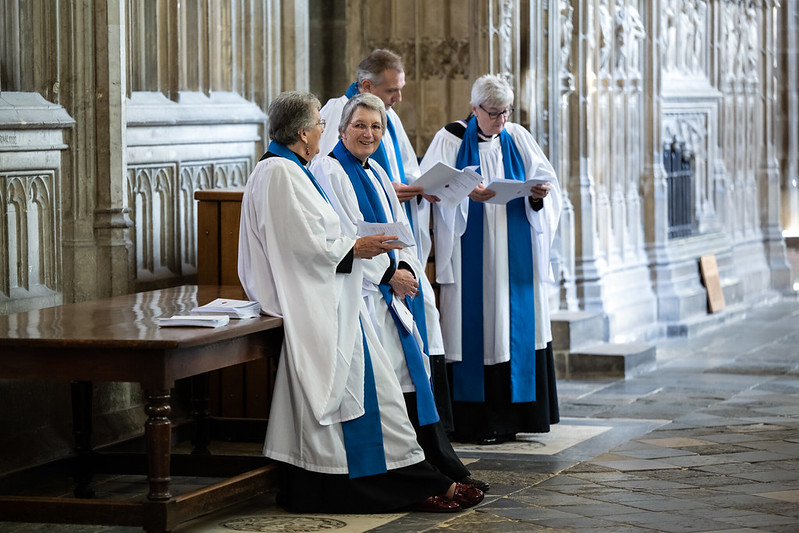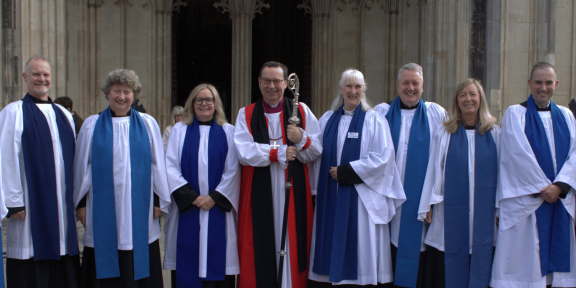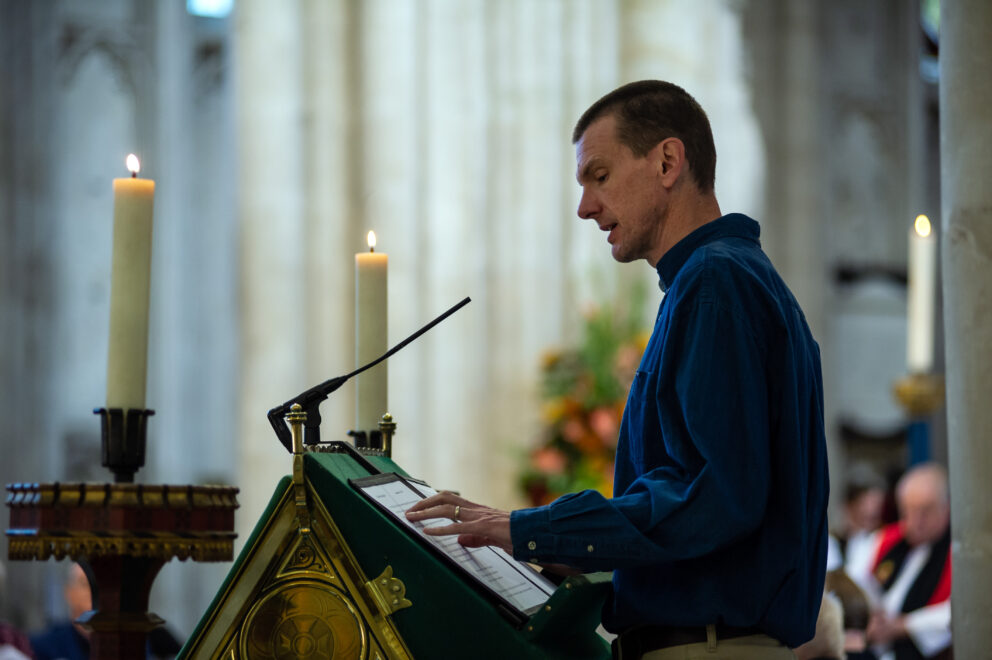“Then I heard the voice of the Lord saying, ‘Whom shall I send? And who will go for us?’ And I said, ‘Here am I. Send me!” Isaiah 6:8
Licensed Lay Ministry (LLM), previously known as Reader Ministry, is the oldest recognised lay public ministry in the Church of England. LLMs carry out a broad scope of ministry within the Church, bringing a range of gifts and services to bring the Good News of Jesus. A Licensed Lay Minister can be involved in many aspects of a church, such as mission and evangelism, chaplaincy, pastoral ministry, youth and children’s ministry, workplace ministry, adult education, as well as teaching, preaching and leading worship. Following a time of discernment with your incumbent and others selection panels are held several times each year ready for training to start each September at Sarum College in Salisbury. The training usually takes two years part-time to complete and encompasses both academic and practical elements to enrich, inspire and equip you to play your part in the ministry of God in the church and the world. On successful completion of training candidates are then licensed at our Lay Licensing Service at the Cathedral in the October of each year.
Discernment Process
For anyone interested in exploring Licensed Lay Ministry the most important first step is to have a conversation with your incumbent, you may also like to attend a vocations day or have an informal conversation with someone in the Diocesan training team (for contact details see below).
Once you and your incumbent have discerned a sense of call to this ministry your incumber requests and returns a referral form from tracey.nicholls@winchester.anglican.org
You will then be invited to a Diocesan selection panel. The provisional panel dates for this coming year are:
28th January
15th April
17th June.
The LLM training was both enjoyable and challenging. The study topics were varied and rigorously taught but the tutors always managed to make them relevant to the work of LLMs today … meeting students from across all Anglican traditions was a real bonus.
– Stephen, a recently licensed LLM

Contextual Training
When it comes to any form of ministry, being rooted in a local church context is key. This includes being supported by a training minister (usually your Vicar/ Incumbent) whom you’ll meet with regularly.
The idea behind contextual training is that integrating theological reflection with ministry and practice becomes second nature and we never stop learning!
Theological Training
While the idea of theological training may seem daunting, just remember that God enables everyone for that which they are called. One previous student said that:
Stepping back into the world of study was a daunting venture into the unknown and yet, with the guidance of an immensely supportive staff team and the friendship of an eclectic and caring bunch of fellow students, I have found it to be stimulating, enriching and immensely helpful to my church ministry.
Alongside contextual training, you will receive high quality learning, with the theological training enabling you to grow in a friendly and stimulating atmosphere, with helpful, welcoming tutors and additional support should you need it.
Licensed Lay Ministry training is usually a two-year pathway leading to a Certificate of Higher Education in Theology, Ministry and Mission (awarded through Durham University).
LLM training is delivered using a blended approach of in-person and online study.
All students have access to a fully resourced online learning platform with an online library of books and articles to hand, as well as access to library books.
Worship Centred Learning Community
Worship is at the heart of who we are as a community, and is a key priority in our gatherings – both in-person and online. As a former student said at the end of training:
All I know is that these new colleagues have become my closest friends and soul mates – and that I thank God daily for the absolute privilege of accompanying each other onwards – as we are together dazzled by the light of Christ…. the author and perfecter of our faith. We travel as pilgrims together, journeying, discerning, learning, obedient and faithful to the core – obedient to the call of Christ.
Most of our worship is student led, and provides an opportunity to become familiar with both the ancient daily rhythms of prayer within the Church of England, as well as celebrate contemporary forms of worship. Special celebration services throughout the year include in-person gatherings at the end of each term and a much-loved annual service to celebrate the completion of the previous year’s students’ completion of training.
Here’s what some of our Licensed Lay Ministers say about their training…
Julie, training for Licenced Lay Ministry at St Paul’s Church in Bournemouth, said of the training: ‘I’ve learnt so much, it’s hard to put a finger on any one thing in particular!’
When asked what she found challenging about the training, Julie said this was ‘the amount of work and reading which you probably don’t realise when you start training, and I think perhaps also it’s really challenging to have your preconceived ideas challenged.’
Despite the challenge of doing so much reading and realising how much ‘preconceived ideas are challenged,’ she found the training extremely rewarding, saying that ‘making a whole lot of new friends and journeying together for the last three years has been amazing.’
Gemma is a youth worker in the benefice of Bentley, Binsted and Froyle. When asked about her experience of LLW training, she said that it was ‘really inspiring meeting other people who are doing a similar kind of thing to me – it’s really exciting meeting lots of different people.’
In terms of offering advice for anyone thinking about becoming a Licensed Lay Worker or Minister, Gemma encourages that ‘it’s not scary – you’re one of the team and everyone’s rooting for you, so don’t worry about being the odd one out.’
If you have any questions about our Licensed Lay Ministry training, please contact Helen O’Sullivan by emailing helen.osullivan@winchester.anglican.org.

